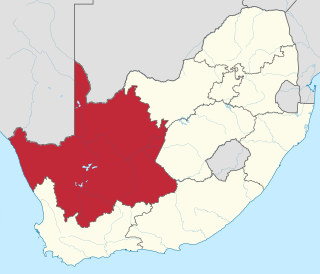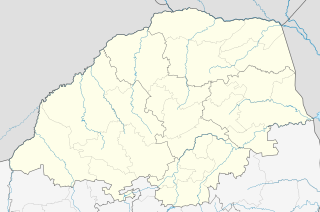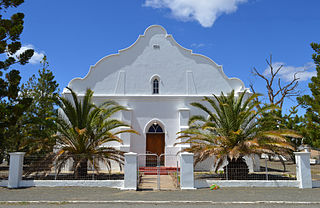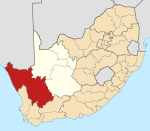Spoegrivier | |
|---|---|
| Coordinates: 30°20′28″S17°45′36″E / 30.341°S 17.760°E Coordinates: 30°20′28″S17°45′36″E / 30.341°S 17.760°E | |
| Country | South Africa |
| Province | Northern Cape |
| District | Namakwa |
| Municipality | Kamiesberg |
| Area | |
| • Total | 0.34 km2 (0.13 sq mi) |
| Population (2011) [1] | |
| • Total | 513 |
| • Density | 1,500/km2 (3,900/sq mi) |
| Racial makeup (2011) | |
| • Black African | 4.3% |
| • Coloured | 94.7% |
| • Indian/Asian | 1.0% |
| First languages (2011) | |
| • Afrikaans | 97.5% |
| • Sign language | 1.8% |
| • Other | 0.8% |
| Time zone | UTC+2 (SAST) |
Spoegrivier is a town in Namakwa District Municipality in the Northern Cape province of South Africa.

Namakwa is one of the 5 districts of the Northern Cape province of South Africa. The seat of Namakwa is Springbok and the region is also known as Little Namaqualand. The majority of its 108,118 people speak Afrikaans. The district code is DC6.

The Northern Cape is the largest and most sparsely populated province of South Africa. It was created in 1994 when the Cape Province was split up. Its capital is Kimberley. It includes the Kalahari Gemsbok National Park, part of the Kgalagadi Transfrontier Park, an international park shared with Botswana. It also includes the Augrabies Falls and the diamond mining regions in Kimberley and Alexander Bay. The Namaqualand region in the west is famous for its Namaqualand daisies. The southern towns of De Aar and Colesberg, in the Great Karoo, are major transport nodes between Johannesburg, Cape Town and Port Elizabeth. In the northeast, Kuruman is known as a mission station and also for its artesian spring, the Eye of Kuruman. The Orange River flows through the province, forming the borders with the Free State in the southeast and with Namibia to the northwest. The river is also used to irrigate the many vineyards in the arid region near Upington.

South Africa, officially the Republic of South Africa (RSA), is the southernmost country in Africa. It is bounded to the south by 2,798 kilometres (1,739 mi) of coastline of Southern Africa stretching along the South Atlantic and Indian Oceans; to the north by the neighbouring countries of Namibia, Botswana, and Zimbabwe; and to the east and northeast by Mozambique and Eswatini (Swaziland); and it surrounds the enclaved country of Lesotho. South Africa is the largest country in Southern Africa and the 25th-largest country in the world by land area and, with over 57 million people, is the world's 24th-most populous nation. It is the southernmost country on the mainland of the Old World or the Eastern Hemisphere. About 80 percent of South Africans are of Sub-Saharan African ancestry, divided among a variety of ethnic groups speaking different African languages, nine of which have official status. The remaining population consists of Africa's largest communities of European (White), Asian (Indian), and multiracial (Coloured) ancestry.
Town some 13 km west-north-west of Karkams and 46 km east of Hondeklipbaai. It takes its name from the non-perennial stream which rises north of it and extends south and then west to enter the Atlantic Ocean 20 km south-east of Hondeklipbaai. Afrikaans for ‘spit river’, the name is probably translated from Khoekhoen Kanoep, referring to a disease affecting cattle. [2]

Karkams is a town in Namakwa District Municipality in the Northern Cape province of South Africa.


















